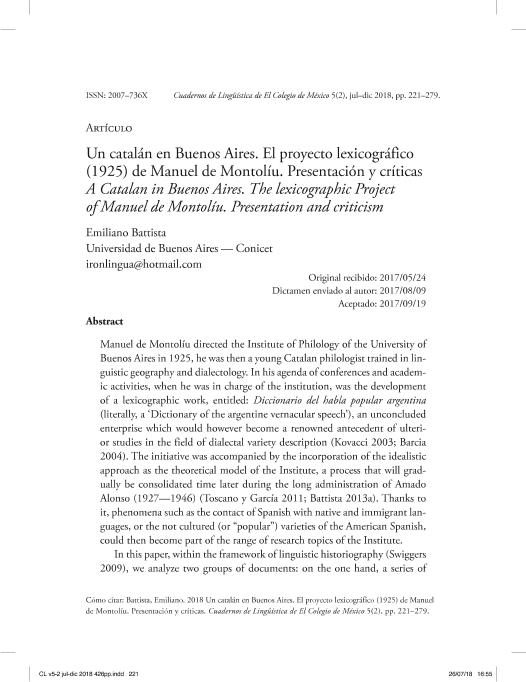Mostrar el registro sencillo del ítem
dc.contributor.author
Battista, Emiliano

dc.date.available
2022-11-09T19:54:52Z
dc.date.issued
2018-08
dc.identifier.citation
Battista, Emiliano; Un catalán en Buenos Aires. El proyecto lexicográfico de Manuel de Montolíu: presentación y críticas; El Colegio de México; Cuadernos de Lingüística de El Colegio de México; 5; 2; 8-2018; 221-279
dc.identifier.issn
2007-736X
dc.identifier.uri
http://hdl.handle.net/11336/177153
dc.description.abstract
Manuel de Montolíu —un joven filólogo catalán formado en geografía lingüística y dialectología— dirigió el Instituto de Filología de la Universidad de Buenos Aires en 1925. En su agenda de conferencias y actividades al frente del organismo estuvo la proyección de una obra lexicográfica: el Diccionario del habla popular argentina, una empresa inacabada que devendría prestigioso material de referencia para trabajos posteriores relativos a la descripción de las variedades dialectales (Kovacci 2003; Barcia 2004). La iniciativa fue acompañada por la incorporación de la perspectiva idealista como modelo teórico del Instituto, un proceso que se consumaría paulatinamente, tiempo después, durante la extensa gestión de Amado Alonso entre 1927 y 1946 (Toscano y García 2011; Battista 2013a). Gracias a ello, pudieron pasar a formar parte del abanico de investigaciones del centro argentino fenómenos tales como el contacto del español con las lenguas indígenas e inmigratorias, y las variedades no cultas (“populares”) del español americano. Nuestro trabajo analiza —desde el marco teórico de la historiografía lingüística (Swiggers 2009)— dos grupos de documentos: por un lado, una serie de intervenciones con las que Montolíu (1925a; 1925b; 1926a; 1926b) presentó el programa de trabajo que debía dar lugar a la elaboración del Diccionario; por otro, una serie de intervenciones de tres intelectuales del ámbito argentino —Almanzor Medina (1928), Arturo Costa Álvarez (1929b) y Vicente Rossi (1932)— que, desde una posición externa al Instituto, ofrecieron una postura crítica frente al saber técnico y modernizador del filólogo catalán, dado que consideraban que la labor de este no dejaba de concebir el habla de los argentinos como un mero desprendimiento de la norma culta castellana.
dc.description.abstract
Manuel de Montolíu directed the Institute of Philology of the University of Buenos Aires in 1925, he was then a young Catalan philologist trained in linguistic geography and dialectology. In his agenda of conferences and academic activities, when he was in charge of the institution, was the development of a lexicographic work, entitled: Diccionario del habla popular argentina (literally, a ‘Dictionary of the argentine vernacular speech’), an unconcluded enterprise which would however become a renowned antecedent of ulterior studies in the field of dialectal variety description (Kovacci 2003; Barcia 2004). The initiative was accompanied by the incorporation of the idealistic approach as the theoretical model of the Institute, a process that will gradually be consolidated time later during the long administration of Amado Alonso (1927—1946) (Toscano y García 2011; Battista 2013a). Thanks to it, phenomena such as the contact of Spanish with native and immigrant languages, or the not cultured (or “popular”) varieties of the American Spanish, could then become part of the range of research topics of the Institute. In this paper, within the framework of linguistic historiography (Swiggers 2009), we analyze two groups of documents: on the one hand, a series of interventions with which Montolíu (1925a; 1925b; 1926a; 1926b) presented the work program that should give rise to the elaboration of the Dictionary; on the other hand, a series of communications given by three intellectuals of the argentine academic sphere —Almanzor Medina (1928), Arturo Costa Álvarez (1929b) and Vicente Rossi (1932)—, who, from outside the Institute, were critical of the Catalan philologist’s technical and modernizing insights, since they considered that his work still conceived the speech of Argentine people as a mere derivation of the learned Castilian norm.
dc.format
application/pdf
dc.language.iso
spa
dc.publisher
El Colegio de México
dc.rights
info:eu-repo/semantics/openAccess
dc.rights.uri
https://creativecommons.org/licenses/by-nc/2.5/ar/
dc.subject
MONTOLÍU
dc.subject
DICCIONARIO
dc.subject
PRESENTACIÓN
dc.subject
CRÍTICAS
dc.subject.classification
Lingüística

dc.subject.classification
Lengua y Literatura

dc.subject.classification
HUMANIDADES

dc.title
Un catalán en Buenos Aires. El proyecto lexicográfico de Manuel de Montolíu: presentación y críticas
dc.title
A Catalan in Buenos Aires. The lexicographic Project of Manuel de Montolíu: Presentation and criticism
dc.type
info:eu-repo/semantics/article
dc.type
info:ar-repo/semantics/artículo
dc.type
info:eu-repo/semantics/publishedVersion
dc.date.updated
2022-11-07T15:37:36Z
dc.journal.volume
5
dc.journal.number
2
dc.journal.pagination
221-279
dc.journal.pais
México

dc.journal.ciudad
Ciudad de México
dc.description.fil
Fil: Battista, Emiliano. Consejo Nacional de Investigaciones Científicas y Técnicas. Universidad de Buenos Aires; Argentina
dc.journal.title
Cuadernos de Lingüística de El Colegio de México
dc.relation.alternativeid
info:eu-repo/semantics/altIdentifier/url/http://cuadernoslinguistica.colmex.mx/index.php/cl/article/view/118
dc.relation.alternativeid
info:eu-repo/semantics/altIdentifier/doi/https://doi.org/10.24201/clecm.v5i2.118
Archivos asociados
